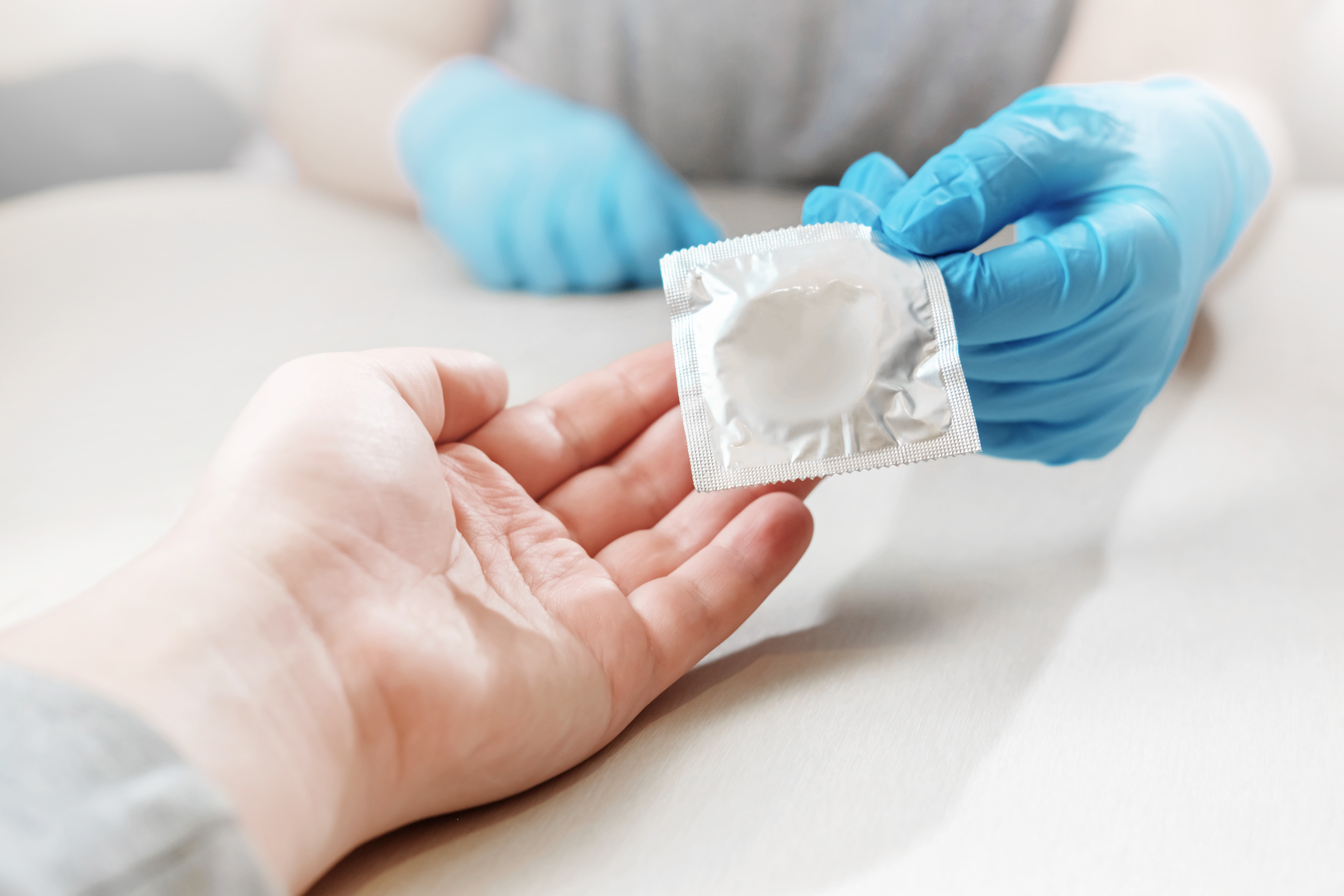How to treat herpes on the penis?



Penis herpes, also known as genital herpes, is a common condition which involves the penis, scrotum and anus area in men.
Although there is no known treatment for genital herpes, several antiviral drugs can reduce the severity of symptoms and aid in avoiding recurrences.
Genital herpes is caused by the herpes simplex virus, but it typically doesn't create any symptoms. The virus can infect a lot of people without their notice.
Genital herpes can transfer from one person to another through sexual activity. It is caused by the herpes simplex virus. HSV-1 and HSV-2 are a pair of herpes simplex viruses that typically cause viral infections in people. HSV-1 and HSV-2 are both extremely prevalent and infectious.
Genital herpes can be brought on by HSV-1, although type 2 herpes is responsible for most cases. Someone with HSV-2 could get sores on their genitalia or scrotum. HSV-2 sores typically develop below the abdomen, though they might appear anywhere.
These widespread viral diseases are spread by close personal contact. HSV-1 can be transmitted through kissing or oral intercourse, but HSV-2 can be acquired through genital intercourse or oral sex with a virus carrier. If the herpes virus is present at the moment of birth, a mother who has it can pass it on to her unborn child.
The majority of people who get the herpes virus don't exhibit any symptoms and sometimes aren't even know they have it.
However, some people develop signs that could be herpes genitalis. Herpes viruses of both varieties can cause this disease.
Blisters or sores can develop around the genitals in those with genital herpes. Cycles of the symptoms are possible.
In addition, oral herpes causes cold sores or fever blisters around the mouth, teeth, or gums. This disorder is typically brought on by the herpes type 1 virus.
Herpes simplex infection leads to the development of genital herpes.
Sexual activity, especially direct oral or genital area contact, seems to be how people spread the virus. For instance, having oral intercourse with a herpes carrier could result in the spread of the virus.
Type 1 viruses are typically spread between people via touching or kissing. Contrarily, during sexual contact, humans often spread type 2 infections.
Herpes can be acquired from a person even if they have no apparent lesions or sores. Not everyone will know if they have contracted or spread the virus.
Herpes simplex virus type 1 and type 2 can both cause genital herpes. The herpes simplex virus (HSV), also known as herpes, is widely spread worldwide. HSV-2, which causes genital herpes, is primarily spread through sexual contact.
Although oral and genital herpes is typically asymptomatic or goes unnoticed, they can both result in red patches or ulcers ranging in severity from moderate to severe. The symptoms of an infection can repeat over a long period. While some drugs help lessen the intensity and frequency of symptoms, they cannot eradicate the underlying infection.
Both oral and vaginal herpes symptoms that recur can be upsetting. Sexual relationships can be negatively impacted by genital herpes and its stigma. But most herpes patients of either type eventually learn to live with the condition.
Asymptomatic or moderate symptoms of genital herpes may go unnoticed. One or more vaginal or anal sores or lesions are present when symptoms of genital herpes first appear.
In addition, fever, pains, and swelling of the lymph nodes are frequent indicators of a new infection. Symptoms may return after an initial episode, which can be quite severe. HSV-1-induced genital herpes normally does not return frequently. Recurring symptoms are typical with HSV-2. However, recurrences typically lessen over time and are less severe than the initial episode.
People who have the following habits can have a higher risk of developing genital herpes.
Your risk of contracting genital herpes rises when you engage in sexual activity without protection. Barriers comprise contraceptives and dental dams, which are condom-like protection worn during oral intercourse. If you are involved with women who already have herpes infection, they can transfer it to you. Contraceptive methods can prevent a direct attachment to the female vagina and reduce the chance of infection.
The number of partners with whom you have intercourse is a significant risk factor. You have a larger risk if you have sex or engage in sexual activities. The majority of genital herpes patients are unaware of their condition.
You run a higher chance of developing a more severe or long-lasting HSV disease and experiencing more reactivations if your immune system is compromised for any reason. An autoimmune disorder, HIV, immunoglobulin A (IgA) disease, an illness like bone marrow malignancy, radiotherapy, or transplantation are a few conditions that might weaken your immune system.
IgA deficiency is the immunological deficit most frequently connected with HSV. IgA is an immunological protein that primarily defends from diseases of the mucous membranes or the thin skin parts that are covered in a fluid-like mucus, including the mouth and genital.
Sharing products like glasses, brushes, and even frequently used towels can spread the HSV-1 infection. Using someone else's lipstick, lip gloss, or lip balm is especially dangerous because they are naturally moist and the virus can attach to them easily.
The following are the various stages of genital herpes
The prodrome is the early stage of a herpes outbreak. Herpes symptoms first appear during this stage, signalling the beginning of an infection. The herpes virus advances to the top layer of skin at this early stage, frequently resulting in redness, itching, tingling, discomfort, or burning in and around the affected region. In the case of genital herpes, an infection that develops in the urethra or labia can make urinating unpleasant.
Before entering the blister stage, your prodrome stage could take a few hours or a few days. Blisters start to grow as soon as the herpes virus touches your skin's surface.
Herpes blisters initially appear as little red lumps that later enlarge and fill with fluid. Even though they may match other prevalent skin conditions like acne, abscess follicles, and jock itch, they are much more contagious.
The blisters will rupture and drain over time. When this occurs, open sores known as ulcers will appear where the blister was. Ulcers first resemble small, fluid-oozing, sometimes bleeding, pink or red lesions. This open soreness stage of the outbreak is more irritating and distressing than the earlier blister stage.
It can take some time for ulcers and sores caused by a herpes outbreak to start recovering. Healing can take somewhere between 2 and 4 weeks for someone who is going through their first herpes outbreak. While recovery time is typically shorter after consecutive occurrences.
They begin to heal outwards when crusts and scabs appear over the ulcer. Itching is a common symptom when the wound is curing. The callous or crust may occasionally split, perhaps resulting in bleeding.
Avoiding contact with another person's mouth or genitalia is the greatest approach to prevent contracting herpes and other sexually transmitted diseases.
But since most people have sex at least once in their lives, understanding safer sex habits is essential. Utilizing protection during sexual activity, such as condoms and dental dams, lowers your risk of developing penis herpes.
Herpes can live on areas of your body that are not covered by condoms. Therefore they are not always effective at protecting you from getting it. However, they do reduce your chance of getting herpes.
When herpes is present, it is contagious; therefore, refrain from having sex with anyone. It is vital to use condoms and dental dams even if everything seems fine because herpes can also transmit even if there are no symptoms or blisters.
You should consult a medical practitioner if you believe you have genital herpes symptoms or have ever been at risk of getting infected.
There are numerous testing options. The most typical test is to collect a sample from a lesion if you have signed. The herpes simplex virus can be detected in the fluid. There is a blood test for herpes. We at the Welzo store provide these tests at an affordable rate with good results.
You should get tested for additional sexually transmitted infections if you have genital herpes. You must inform your most recent sexual partner so they can be checked and medicated. By alerting them to their condition, you can assist prevent the spread of the herpes virus since many people with the disease are unaware of any symptoms.
Most people have minimal or no symptoms and don't suffer any long-term effects from the virus.
Those who show symptoms can ask their doctors for antiviral prescription drugs. These medications could reduce the severity of the symptoms or stop them from happening again. Creams applied topically may also reduce discomfort.
Currently, there are no vaccines available to protect against genital herpes virus infection. The risk of contracting or spreading genital herpes can, however, be decreased by engaging in safe sexual behaviours, such as:
Preventing sexual activity while a person has symptoms.
Use Condoms while having sex
Avoid sex with multiple partners
Talk to your doctor if you have symptoms of genital herpes
While the symptoms of genital herpes can erupt, these methods help lessen the chance of getting it.
It's also crucial to remember that herpes can spread to other body parts, including the eyes, if someone contacts the herpes lesions' fluid or the ulcers themselves.
Order a private Welzo Herpes Test from our store here.










Plus get the inside scoop on our latest content and updates in our monthly newsletter.